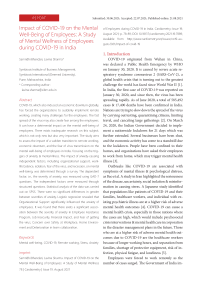Impact of COVID-19 on the Mental Well-Being of Employees: A Study of Mental Wellness of Employees during COVID-19 in India
Автор: Samridhi Bhandari, Lavina Sharma
Журнал: Cardiometry @cardiometry
Статья в выпуске: 19, 2021 года.
Бесплатный доступ
COVID-19, which also induced an economic downturn globally, has forced the organizations to suddenly implement remote working, creating many challenges for the employees. The fast spread of the virus may also create fear among the employees. It can have a detrimental impact on the mental well-being of employees. There exists inadequate research on this subject, which is not only new but also very important. The study aims to assess the impact of a sudden transition to remote working, economic downturn, and the fear of virus transmission on the mental well-being of employees in India, focusing on the triggers of anxiety & mental illness. The impact of anxiety-causing independent factors, including organizational support, worklife balance, isolation, fear of the virus, and recession, on mental well-being, was determined through a survey. The dependent factor, i.e., the severity of anxiety, was measured using GAD-7 questions. The independent factors were measured through structured questions. Statistical analysis of the data was carried out on SPSS. There were no significant differences in gender between severities of anxiety. Logistic regression revealed that Organizational Support significantly influenced the anxiety of employees. It was found that there exists a significant association between the severity of anxiety in Employee Assistance Program, Job Insecurity, Financial Impact, and Fear of getting the virus, Concern over Safety at Workplace, Home Environment and Deterioration in team collaboration
Mental well-being, COVID-19, Remote working, Stress, Anxiety
Короткий адрес: https://sciup.org/148320554
IDR: 148320554 | DOI: 10.18137/cardiometry.2021.19.7889
Список литературы Impact of COVID-19 on the Mental Well-Being of Employees: A Study of Mental Wellness of Employees during COVID-19 in India
- Abrams, Z. (2019). The future of remote work. American Psychological Association, 50(9), 54. https:// www.apa.org/monitor/2019/10/cover-remote-wor
- Allvin, M., Aronsson, G., Hagstrom, T., Johansson, G., & Lundberg, U. (2011). Work Without Boundaries, Psychological Perspectives on the New Working Life. Wiley-Blackwell.
- Bao, Y., Sun, Y., Meng, S., Shi, J., & Lu, L. (2020, February). 2019-nCoV epidemic: address mental health care to empower society. THE LANCET, 395(10224), pp. e37-e38.
- BIS. (2010). Flexible Working and Work-Life Balance. http://www.bis.gov.uk/
- Blomqvist, S., Burström, B., & Backhans, M. C. (2014). Increasing health inequalities between women in and out of work - the impact of recession or policy change? A repeated cross-sectional study in Stockholm county, 2006 and 2010. International Journal for Equity in Health, 13, 51.
- Brown, A., Charlwood, A., & Spencer, D. (2012). Not all that it Might Seem: Why Job Satisfaction is Worth Studying despite it being a Poor Summary Measure of Job Quality. Work Employment & Society, 26(6), 1007-1018
- Burgard, S. A., Brand, J. E., & House, J. S. (2009). Perceived job insecurity and worker health in the United States. Soc Sci Med., 69(5), 777–785.
- Burger, C., Matthews, R., & Hoffman, M. (2007). Work and Personal Life Boundary Management: Boundary Strength, Work/Personal Life Balance, and the Segmentation - Integration Continuum. Journal of Occupational Health, 12(4), 365-375.
- CDC. (2019). Mental Health in the Workplace. https://rb.gy/rstajw
- Chandwani, S. (2020, May). COVID-19: ‘Returnto-Work’ checklist for employers. People Matters. https://rb.gy/unv6nk
- COVID-19 crisis: Companies cutting salaries during lockdown will need employees’ consent. (2020, April). CNBC TV18. https://rb.gy/gf0exi
- Dong, L., & Bouey, J. (2020). Public Mental Health Crisis during COVID-19 Pandemic, China. Emerg. Infect. Dis., 26(7).
- Drydakis, N. (2015). The effect of unemployment on self-reported health and mental health in Greece from 2008 to 2013: A longitudinal study before and during the financial crisis. Social Science & Medicine, 128, 43-51.
- Earnshaw, V. (2020, April). Do not Let Fear of Covid-19 Turn into Stigma. Harvard Business Review. https://hbr.org/2020/04/dont-let-fear-of-covid-19-turn-into-stigma
- Ellison, N. (1999). Social Impacts: New Perspectives on Tele-Work. Social Science Computer, 17(3), 338–356.
- Ergeneli, A., & Ilsev, A. (2010). Work-family Conflict and Job Satisfaction Relationship: The Roles of Gender and Interpretive Habits. Gender, Work and Organization, 17(6), 679-95.
- Fagan, C., Lyonette, C., Smith, M., & Saldana-Tejed, A. (2012). The influence of working time arrangements on work-life integration or ‘balance’: A review of the international evidence. Conditions of Work and Employment Series No. 32.
- Flash Eurobarometer 338. (2012). Monitoring the Social Impact of the Crisis: Public Perceptions in the European Union, wave 6. https://rb.gy/wjdnxa
- Frasquilho, D., Margarida, M. G., Salonna, F., Guerreiro, D., Storti, C. C., Gaspar, T., & Caldas-de-Almeida , J. M. (2016). Mental health outcomes in times of economic recession: a systematic literature review. BMC Public Health, 16, 115.
- Gili, M., Roca, M., Basu, S., McKee, M., & Stuckler, D. (2013). The mental health risks of the economic crisis in Spain: evidence from primary care centres, 2006 and 2010. Eur J Public Health, 23(1), 103–108.
- WHO. (2020, March). Mental health and psychosocial considerations during the COVID-19 outbreak. https://rb.gy/cebxnu
- World Health Organization. (2019, May). Mental health in the workplace. https://rb.gy/orno0t
- Zandifar, A., & Badrfam, R. (2020, June). Iranian mental health during the COVID-19 epidemic. Asian Journal of Psychiatry, 51.


